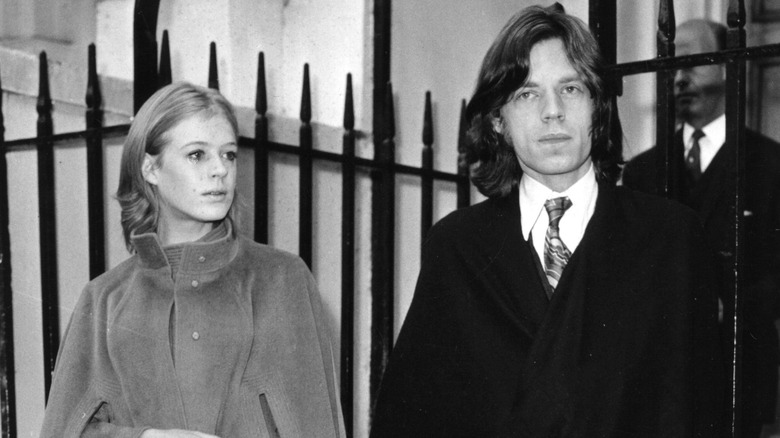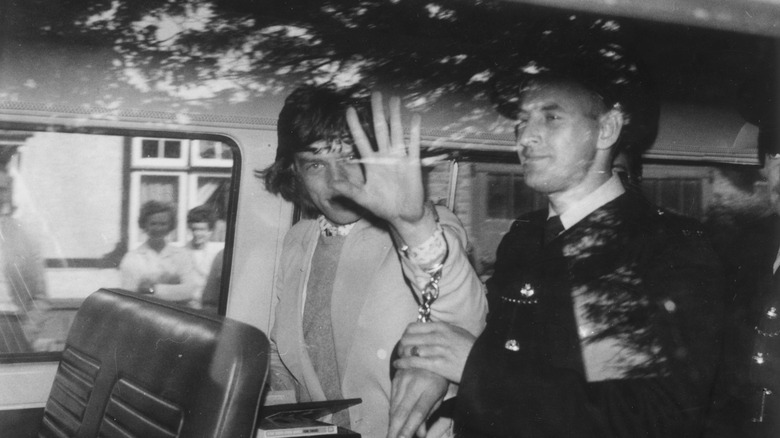Mick Jagger's Unexpected Response To His Time In Jail
The members of the Rolling Stones are some of the most legendary figures in rock 'n' roll history and tales of their exploits are still eaten up by fans decades later. Given the hard and fast way most of the band lived — especially in the 1960s — it's amazing any of them survived for decades.
Of course, they weren't without their fair share of tragedies and troubles, and that included multiple members in and out of prison. One of them — guitarist Brian Jones — was later found dead in his swimming pool when he was just 26 years old after dealing with a drug problem that landed him in trouble on multiple occasions. His obituary in Rolling Stone read, "at the bottom of his swimming pool, probably swallowing some water, too stoned to catch his breath and come up for air."
While Jones wasn't as lucky to make it out of the 1960s, the band's peacock-strutting frontman Mick Jagger was. Like Jones, he struggled with a drug habit that landed him in the clink, but one of the most surprising parts of his time in jail was how he responded to his sentence (via The Daily Beast).
The Stones land in hot water
In February of 1967, the English paper "News of the World " ran a story in which they claimed that Mick jagger admitted to using LSD and even offered the reporter marijuana (via The Daily Beast). This didn't sit well with Jagger who decided to take the paper to court, but his case fell apart the very next weekend. According to Philip Norman's biography "Mick Jagger," The Rolling Stones swung by Abbey Road recording studios to watch the Beatles record what became one of the most revered songs, "A Day in the Life" off of "Sgt. Pepper's Lonely Hearts Club Band."
Afterward, a bunch of people, including Jagger and his then-girlfriend, singer Marianne Faithfull, went to take LSD at Keith Richards' house. Unfortunately, their mellow was harshed when police were called to the scene. In the room where Jagger and Faithfull were staying, police found drugs that Jagger said belonged to him. According to Faithfull's autobiography, police took evidence from Richards' house and told him that if anything they gathered was found to be contraband, he was liable. Sure enough, they did and on May 10, 1967, both Jagger and Richards were charged.
Jagger's reaction to prison
In her 1994 autobiography, "Faithfull," Mariane Faithfull wrote that upon hearing he was going to serve time in prison, Mick Jagger sobbed. "He began crying uncontrollably. At that moment I snapped. I simply couldn't handle an overwhelming display of emotion. Mick's helplessness rankled me and I must say, to my undying shame, I wasn't very compassionate about it," she wrote.
While going to prison is never a cakewalk, Jagger, who was sentenced to three months, and Richards, who was handed a one-year sentence, were treated well in prison, according to Philip Norman's "Mick Jagger" biography. So well, in fact, that they weren't even required to cut their hair. Fortunately for the two of them, after an appeal was filed, they got out of jail quickly. The appeal worked and Jagger was left with a conditional discharge, while Richard's conviction was overturned.
Surprisingly, Jagger would echo those sentiments that he was treated well, and even said that his cell "wasn't so much worse than a hotel room in Minnesota." Now, whether he meant that comment as a glowing review of English prisons, or an indictment of Minnesotan hotel rooms — or even both — remains to be seen.


